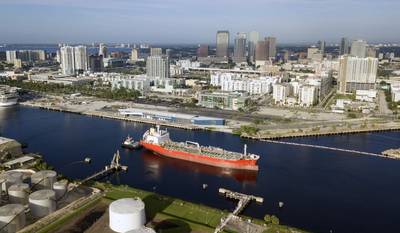Congress Lines Up COVID-19 Relief for the Maritime Industry
New legislation passed through Congress aims to provide relief to the U.S. maritime industry during national emergencies such as the ongoing COVID-19 pandemic or natural disasters.
Introduced July 9 by the Chair of the House Committee on Transportation and Infrastructure Peter DeFazio (D-Ore.) and Chair of the House Subcommittee on Coast Guard and Maritime Transportation Sean Patrick Maloney (D-N.Y.), The Maritime Transportation System Emergency Relief Act (MTSERA) would establish for the first time a comprehensive maritime emergency relief authority to enable the Maritime Administration (MARAD) to provide financial assistance to stabilize and ensure the reliable functioning of the U.S. Maritime Transportation System (MTS) in the event of a national emergency or disaster, including, the current COVID-19 public health emergency.
This new emergency relief authority is designed to help eligible state entities and other eligible maritime supply chain entities engaged in vessel construction, transportation by water, or other maritime support activities (e.g., harbor pilots, assist tugs, stevedores, etc.). MARAD would be authorized to provide grant assistance to pay for repairing and/or replacing equipment, facilities, and shore infrastructure that have suffered serious damage during a major natural disaster such as floods, hurricanes or tsunamis. MARAD also is authorized to reimburse or provide assistance to cover the operating and overhead costs involved with emergency response operations, cleaning, sanitization, janitorial services, staffing, workforce retention, paid leave, procurement of protective health equipment and training for employees and contractors, debt service payments, infrastructure repair projects, and other MTS operations before, during or after an emergency necessary to keep the MTS operating reliably and efficiently.
The bill could be become law later this year, as the MTSERA was added to the House National Defense Authorization Act (NDAA) for Fiscal Year 2021 during consideration on the House floor as part of a package of amendments.
The U.S. House of Representatives passed the NDAA Tuesday, with the Maritime Relief Act attached. The U.S. Senate is expected to vote on their version of the NDAA shortly. While the Senate NDAA does not contain a similar provision, the differences will be resolved in a House-Senate conference later this year.
“I am thankful to my House colleagues for stepping up today for the maritime industry,” DeFazio said. “The Maritime Transportation System Emergency Relief Act would for the first time authorize the Maritime Administration to provide financial assistance to stabilize and ensure the reliable functioning of the U.S. Maritime Transportation System in the event of a national emergency or disaster, including, the current COVID-19 public health emergency. The hard-working men and women of the maritime industry have kept critical goods moving during the global pandemic, and for that our thanks are not enough. This bill gives them the same protections and relief given to other industries during COVID-19.”
The legislation comes on the heels of a Subcommittee hearing May 29, during which members heard directly from the maritime community about the unprecedented challenges it is facing amid the global pandemic.
“Ensuring the maritime industry has the resources it needs during an emergency or natural disaster is an important step in protecting the workers, national security assets, and goods that pass through our ports every day,” Maloney said. “The coronavirus pandemic made it clear that we need more support and systems in place to stabilize the industry in the event of a catastrophe. The Maritime Transportation System Emergency Relief Act will help better support this vital industry in a comprehensive way, and get the United States Maritime Transportation System the reliable support it needs for the future.”
Also passed within the NDAA is the Elijah E. Cummings Coast Guard Authorization Act of 2020, led by DeFazio to authorize funds for, reinforce and support the United States Coast Guard and Federal Maritime Commission (FMC). The House has passed similar legislation in July of 2019, but the Senate failed to act. This time, the bill has been negotiated with Senate committee leaders and now heads to the Senate to be reconciled in conference with the Senate NDAA.
“The men and women of the U.S. Coast Guard work tirelessly to keep our coastal communities safe, maintain the security of our ports and waterways, carry out critically important drug interdictions, and respond to emergencies and disasters,” DeFazio said. “This bill ensures they have the resources necessary to complete their missions safely and effectively . . .This legislation is vital to our Coast Guard and maritime workers across the country—I encourage a swift passage through the Senate and look forward to the President signing it into law.”
The NDAA also includes other legislation introduced in an amendment by DeFazio to provide further support maritime industry.
The Elijah E. Cummings Mariner Workforce Development Act establishes a merchant mariner career training loan program that will provide assistance to merchant mariners who are enrolled in a course of study to obtain or upgrade a document or license. It also establishes a program to award grants to maritime training institutions to enable them to carry out demonstration projects that will support the development and implementation of new methods of recruiting, training, and retaining individuals in the merchant mariner workforce.
The Coastal and Inland Ports and Terminals Commerce Improvements Act establishes a competitive grant program for projects at smaller ports and terminals and allows privately-owned terminals to compete for assistance.
The amendment also establishes a National Shipper Advisory Committee to advise the FMC on policies relating to the competitiveness, reliability, integrity and fairness of the international ocean freight delivery system.














